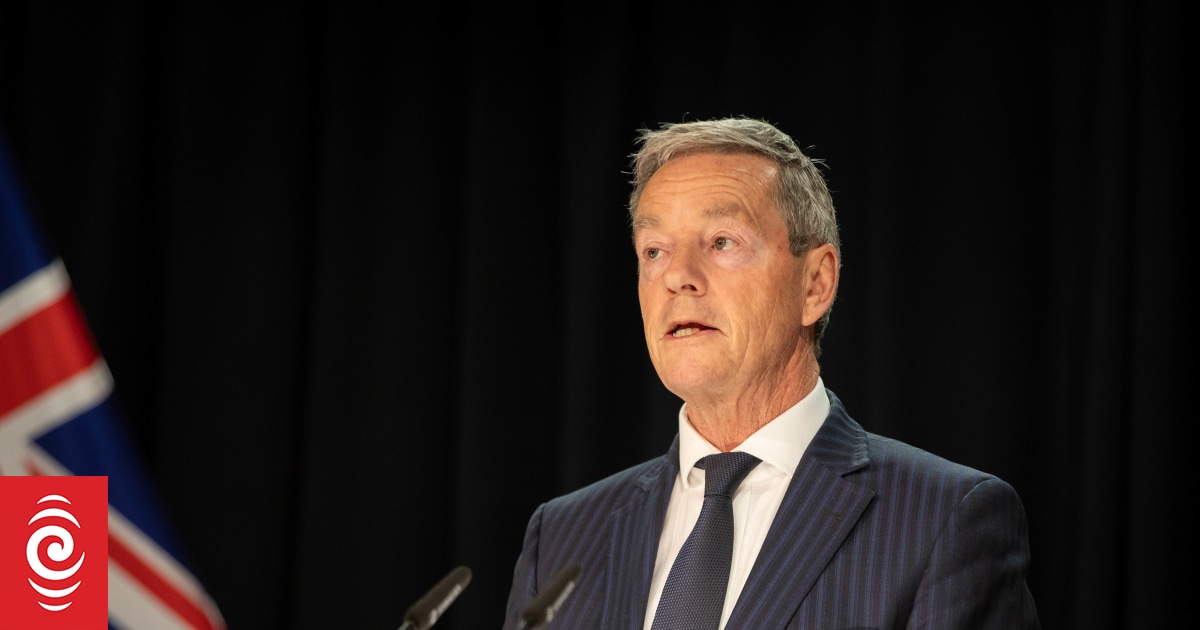
Commerce and Consumer Affairs Minister Andrew Bayly has been looking at ways KiwiSaver funds could be better used to grow the economy.
Photo: RNZ / REECE BAKER
Fancy a slice of an infrastructure investment, or a business that isn’t listed on a stockmarket, in your KiwiSaver scheme? The Commerce and Consumer Affairs Minister would like to make it happen.
Minister Andrew Bayly says he has been meeting KiwiSaver providers to understand the barriers they face when investing in unlisted New Zealand businesses and infrastructure projects.
Before the election, National had campaigned on a number of proposed changes to the retirement savings scheme, including allowing people to have an account with more than one provider.
Bayly said that work was still in the policy development stage.
His main focus was on whether KiwiSaver funds could be better used to grow the economy.
“A bigger economy means higher wages, improved living standards and more choice for Kiwis. To do this, we need to make it easier for businesses to access finance and debt so they can grow and invest in upskilling their workforce, acquiring new technology and expanding their operations,” he said.
“That’s why I am keen to better leverage funds held by KiwiSaver to invest in great New Zealand businesses. Right now, there is a reluctance to invest in unlisted assets. For example, of the roughly $110 billion invested in KiwiSaver, only 2 to 3 percent is invested in private assets. By comparison, around 16 percent of Australia’s $3.6 trillion pension funds is invested in private assets. My objective is to remove any impediments that restrict KiwiSaver fund managers to invest in great New Zealand businesses.
“I expect to be able to share more information about KiwiSaver work we are progressing later this year.”
Dean Anderson – founder of KiwiSaver scheme Kernel – said there was nothing to stop KiwiSaver schemes investing in “New Zealand Inc” assets like property, infrastructure or venture capital.
“The real issue is the lack of a clear, collective political strategy on how we want to channel investment into our country and the role of private capital in such strategy. For example, we need a broader, bipartisan conversation on topics such as creating a general infrastructure fund-something that KiwiSaver, NZ Super, and other investors can rally around. This would build alignment, scale, and shared expertise to create long-term value for all of New Zealand.
“As a small nation, collaboration is key to unlocking these larger, long-term structural opportunities. But instead of tackling the big issues head-on, we’re dabbling around the fringes and ignoring the policy conversations that need to happen for the long-term benefit of Kiwis.”
He said for KiwiSaver, there were more fundamental issues to address first.
“For example, a discussion on increasing the contribution rates for KiwiSaver-like Australia did with their multi-decade plan to gradually increase contributions to 12 percent-and whether tax settings on retirement savings should be adjusted to incentivise collective savings.
“We’re also missing the chance to rethink how the government’s $1 billion annual tax contribution could be better used. Should we be re-allocating it to help under-18s get started with KiwiSaver? It’s time to stop kicking the can down the road and start making decisions that will set Kiwis up for success in the decades to come.”
Another change that was campaigned on was allowing young people to tap into their savings to pay for a rental bond.
Housing Minister Chris Bishop said work had not started on that yet because he had other priorities.
“I will be taking advice on the KiwiSaver bonds issue this year.”
Anderson said he was not in favour of such a change.
“Making these sort of changes erodes consumer understanding and confidence in KiwiSaver…The challenge of bonds can be addressed through other means if it is causing large social harm, such as an extension to the student loan regime to enable access to low-cost borrowing.”
Bayly said there was other work going on in relation to KiwiSaver, such as a bill to make it easier for young people to sign up to KiwiSaver with the signature of one guardian.

